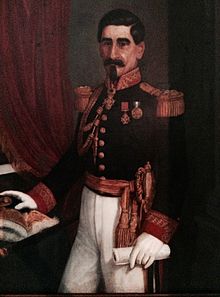José Víctor Zavala
| José Víctor Ramón Valentín de las Ánimas Zavala y Córdova | |
|---|---|

Mariscal Zavala portrait
|
|
| Born |
November 2, 1815 Guatemala City |
| Died | March 26, 1886 (aged 70) Guatemala City |
| Place of burial | Guatemala City |
| Allegiance | Guatemala |
| Service/branch |
|
| Years of service | 1848 - 1885 |
| Rank | Field Marshal |
| Battles/wars |
|
José Victor Zavala (November 2 of 1815 – March 26 of 1886) was a Guatemalan Field Marshal who participated in the wars of Rafael Carrera and the National War of Nicaragua against the invasion of William Walker. After the death of President Carrera in April 1865, Zavala -who was a close friend of the late President - was proposed as the next president, but instead Field Marshal Vicente Cerna y Cerna was appointed. A military brigade headquarters in Guatemala City is named "Mariscal Zavala Brigade" in his honor.
Zavala y Córdoba was born in Guatemala City and was educated on sound moral principles that he would always hold in high esteem and were decisive for his formation, making him a good friend among those who knew him. While still very young, he was sent to the United States, where he received a broad education. His father wanted for him that upon his return to Guatemala we would become a lawyer at the Academy of Sciences of Guatemala; however, it did not work as his family had hoped because his character did not fit a law career.
Zavala began his military career when he joined the Army to put out the peasant uprisings commanded by Rafael Carrera who -ironically- eventually would be his loyal collaborator and friend; likewise attended numerous expeditions, among which may be mentioned, fighting against Serapio Cruz in action Patzún in July 1848, also participated in the historic Battle of La Arada, on 2 February 1851 and subsequent action against Honduras in 1853, so he was considered as one of the winners of Fort San Fernando de Omoa. He fought under the command of race when he was appointed Commander in Chief Army of Guatemala (1844), and then life president of the country (1854-1865). In 1854, he was one of the signatories of the decision that declared life president General Rafael Carrera. A personal friend of Carrera, he was talking in French with José Carrera, the son of the president, right when Joseph returned to Guatemala after finishing his education in Europe, and shortly before Joseph died in his first bout at the port of Omoa in 1853.
At the age of 42, he accomplished his greatest military achievement: still a Sergeant Major, Carrera sent him to Nicaragua in 1856 to participate in the National War of Nicaragua against William Walker as part of the Allied Army Central. He led his troops through Nicaraguan territory and then joined the column under General Mariano Paredes with whom he went to Cojutepeque, achieving a landslide victory. He commanded the contingent of Guatemala after the death of General Paredes, and as Lieutenant Colonel, who had been appointed commander of the Guatemalan forces by Carrera. Frederic Rosengarten Jr. named him as the "sliest" of the leaders who attended the campaign.
...
Wikipedia
